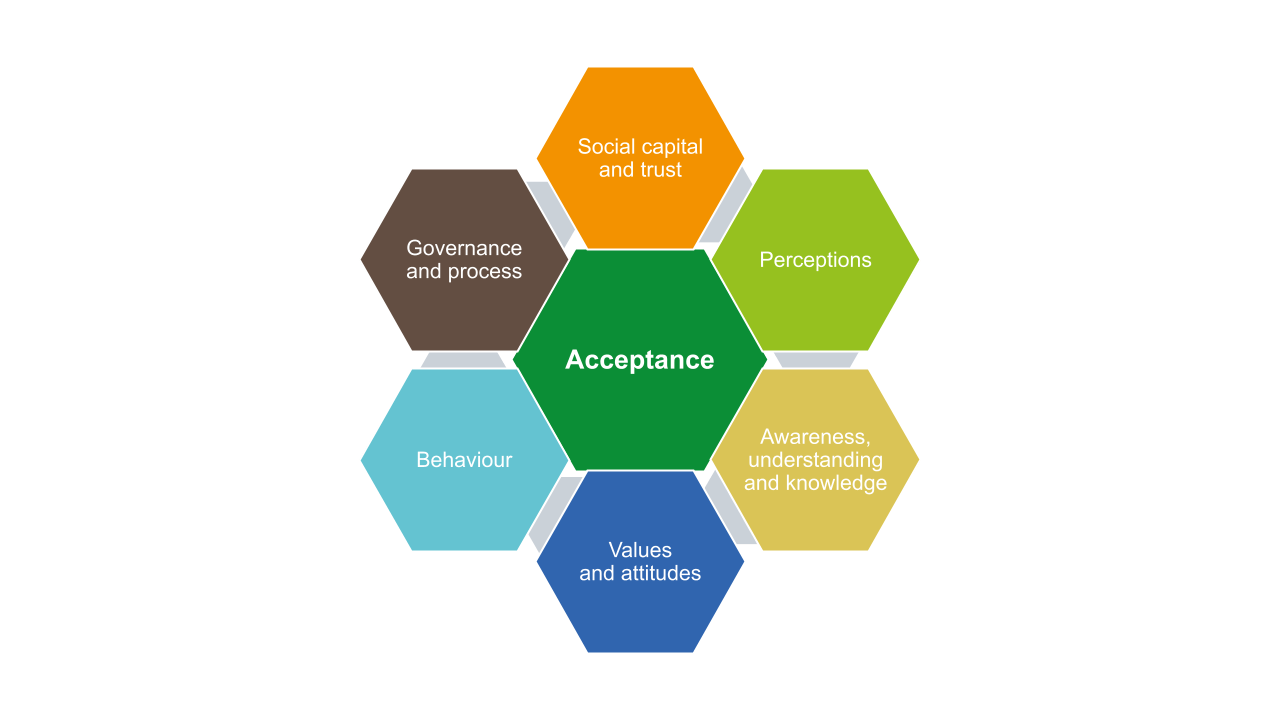
Understanding Nature-Based Solutions Acceptance: Early Insights
What does it take for people to embrace Nature-Based Solutions (NBS)? This is the question at the heart of the LAND4CLIMATE project, where we explore how communities and landowners respond to innovative measures that use natural processes to address climate risks. While the technical potential of NBS is increasingly recognised, their implementation ultimately depends on whether they are accepted by those directly affected.
For LAND4CLIMATE NBS acceptance is a multidimensional process, shaped by awareness, perceptions, attitudes and values, social capital and trust, governance, and behaviour. Within this framing, perceptions (Wolsink, 2018), attitudes (Anderson & Renaud, 2021; Anderson et al., 2021), and values (Ferreira et al., 2022) play a particularly crucial role, influencing how individuals and communities judge whether NBS are legitimate, relevant, valuable, and worth investing in. Acceptance is not static: it evolves as people negotiate trade-offs, balance risks and benefits, and engage with broader community values and social capital (Giordano et al., 2020; Putnam, 2000).
How are we studying acceptance?
In LAND4CLIMATE, DEN Institute, alongside other research partners, work closely with our Front-Running Regions (FRRs) in Austria, Czechia, Germany, Italy, Romania, and Slovakia to study how acceptance unfolds in practice. Each FRR is piloting NBS measures in real landscapes, while engaging directly with farmers, residents, local authorities, and community groups.
Our research methodology is still under development but will involve activities linked to:
- Local engagement – bilateral meetings, discussion groups and surveys to gather first-hand perspectives.
- Trusted intermediaries – such as farmers’ associations, housing companies, and NGOs, who act as a bridge between communities and implementers.
- Comparative learning – connecting experiences across diverse regions to understand what facilitates or hinders acceptance.
This approach reflects insights from research showing that acceptance depends not only on technical effectiveness, but also on values, co-benefits, and perceptions of fairness and legitimacy (Wolsink, 2018).
What do the FRRs think so far?
Although it is early days, from DEN’s interviews with the FRRs in July 2025, several emerging insights are already clear:
- Economic loss, economic support. Without financial backing, many farmers view NBS as a costly loss of productive land rather than a climate solution.
- It’s a personal affair. Acceptance often comes through case-by-case negotiations and educational events that highlight shared values and long-term benefits.
- Strong local networks matter. Trust is built through intermediaries, expert-led talks, and collaborative events that connect residents, farmers, and implementing authorities.
- Show me, don’t tell me. Demonstrating tangible benefits is crucial for building acceptance, especially where scepticism towards NBS is high.
- Grey infrastructure bias. In some regions, people still favour traditional technological fixes, underscoring the need for demonstration and communication.
- Timing is crucial. Timing is everything when engaging with landowners. An engagement deemed too early in the process makes onboarding difficult. However, engagement too late in the process risks losing landowners’ trust as it feels like an imposition.
The message appears clear: there is no one-size-fits-all strategy. Acceptance depends on local context, timing, and the social fabric of communities. While funding and policy support remain vital, softer approaches, building trust, fostering shared values, and showing results, are equally important in turning NBS from abstract ideas into accepted practice.
Key References
- Anderson C.C. and Renaud F.G. (2021) “A review of public acceptance of nature-based solutions: The ‘why’, ‘when’, and ‘how’ of success for disaster risk reduction measures”. Ambio 50(8), Pages 1552–1573. https://link.springer.com/article/10.1007/s13280-021-01502-4
- Anderson C.C., Renaud F.G., Hanscomb S., Munro K., González-Ollauri A., Thomson C., Pouta E., Soini K., Loupis M., Panga D., and Stefanopoulou, M. (2021). Public Acceptance of Nature-Based Solutions for Natural Hazard Risk Reduction: Survey Findings From Three Study Sites in Europe. Frontiers in Environmental Science. 9. https://www.frontiersin.org/journals/environmental-science/articles/10.3389/fenvs.2021.678938/full
Giordano R., Pluchinotta I., Pagano A., Scrieciu A., and Nanu F. (2020). “Enhancing nature-based solutions acceptance through stakeholders' engagement in co-benefits identification and trade-offs analysis”. Science of The Total Environment, Volume 713, Pages 1-18. https://doi.org/10.1016/j.scitotenv.2020.136552
- Ferreira V., Barreira A.P., Pinto P., and Panagopoulos T. (2022). “Understanding attitudes towards the adoption of nature-based solutions and policy priorities shaped by stakeholders’ awareness of climate change”. Environmental Science & Policy, Volume 131, Pages 149-159. https://doi.org/10.1016/j.envsci.2022.02.007
Putnam R.D. (2000). Bowling Alone: The Collapse and Revival of American Community. Simon & Schuster; New York, NY, USA.
Wolsink M. (2018). “Social acceptance revisited: gaps, questionable trends, and an auspicious perspective”. Energy Research & Social Science, Volume 46, Pages 287-295. https://doi.org/10.1016/j.erss.2018.07.034
This article was written from LAND4CLIMATE consortium partner DEN Institute
Publishing date: